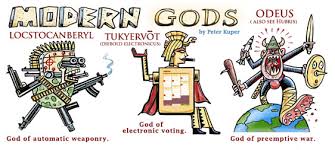Where Are the Gods of the Modern World? July 10, 2015
Author: Beach Combing | in : Ancient, Contemporary, Medieval, Modern, Prehistoric , trackbackForget the Iron Age, the Nuclear Age, the Internet Age. There are three periods of human endeavor: nomadic hunter-gathering before history; agriculture, which began about 8000 BC and ended in most parts of the west in the last one hundred and fifty years (when a majority of citizens had left the land); then finally industrial civilization and the sedentary lifestyle that most of us now have adopted. Much of our nostalgia for past innocence is misplaced because instead of longing for the African savanna, we long for the intermediate period: the sweaty fields of harvest. Archaic village festivals (Morris dancing and cheese rolling), fairies (apparently the spirits of fertility), witchcraft (the enemies of fertility), and almost every pantheon in our text books is from that lost agricultural world, probably the most miserable of the three phases of human history. It is only with some ghost stories (the hungry dead), tales of animal transformation (werewolves etc) and ‘shamanism’ (whatever that is) that we come close to the original human personality, those relatively few men and women who lived in the great spaces, moving from spring to spring, and sniffing the air at dawn for four-legged protein.
If each phase of human history has created its own religious sensibility what is the sensibility of the industrial world? It would be tempting to put in a claim for monotheism, but that just doesn’t add up. The Middle Ages, in some ways the most agricultural societies that have ever existed, insisted on God’s monopoly and elevated him with their cathedral spires and minarets. The industrial age has not seen the collapse of organized religion, but it has seen, for the first time in history, a large percentage of the population reject the supernatural limiting themselves to newspaper zodiacs and lucky charms for the lottery. So what is the true mythology of the modern world? Are we really reduced to urban legends (alligators in sewers) as our legends, serial killers and dictators (Bundy and Hitler) as our devils, and the occasional crusading journalist or secular saint as our angels? Or is this just the pale shadow, the tail bone of the Manichean agricultural world, where winter and summer vied against each other? Perhaps the true religion of the modern world is the individual, ‘the American dream’, and the success of self. It seems an impoverished and unpromising view: and it seems, in any case, not really to do the modern world justice. Other thoughts on the gods of modernity? Drbeachcombing AT yahoo DOT com And please don’t say ‘superheroes’…
20 July 2015: Chris S writes ‘I propose our modern gods are superheroes. DC Comics tend to be more Olympian, representing different aspects of nature and humanity.
For example: Superman = Optimism as a humanitarian Zeus analogue. Superman is analogous to Moses, having been sent to Earth by his doomed parents. The Flash finds a parallel with Hermes, embodying hope with Barry Allen sacrificing himself in Crisis on Infinite Earths to prevent the Anti-Monitor from destroying the entirety of the multiverse. More grossly, Barry Allen “came back” during Blackest Night and received a Blue Lantern ring. Blue Lanterns embody hope. Green Lanterns embody will and courage, only thwarted by Yellow Lanterns who utilize fear. Aquaman’s realm of water carries resonance with Poseidon, obviously. Batman represents the pinnacle of human potential, like Hercules, except his parents are dead. Without the baggage of his parents, Batman embraces new ideas and concepts, facilitating his capability to think outside of the box and be Gotham’s greatest detective.
Going beyond the cornerstones of DC’s universe, towards the Justice League, there’s plenty of 4 color fodder in minor heroes who don’t count as much. Leading me to the other side of the comics coin, Marvel. Marvel has its own deep mythology. The Fantastic Four represent the four elements, Reed Richards/Mr. Fantastic is water, Sue Richards/Invisible Woman is air, Johnny Storm/Human Torch is fire, and The Thing is earth. Spider-Man is a humanistic analogue to Batman. Bruce Wayne has no guilt about his parents’s death, dying in an alleyway when he was little, only a sense of purpose to fight crime. Spider-Man blames himself for his Uncle Ben’s death by being selfish and not stopping the guy who ripped off the wrestling promotion who briefly hired Peter Parker. The Hulk represents the power of the atom, finding genesis in the explosion of a gamma bomb. Captain America is an amalgamation of Superman’s optimism coupled with science elevating him to the peak of human physical ability like Batman.
Importantly, the Marvel heroes are fallible like Odysseus and (eventually) take responsibility for their screw-ups. DC heroes? They’ll fight some cosmic terror, Metropolis/Gotham will be devastated, and there’s little to no reflection upon the destruction and if it could’ve been prevented. Marvel shows, if tangentially, the human toll of these epic battles. How Marvel heroes can appreciate the lives of regular people, rather than dwelling in their ivory towers, deigning to mingle when secret identities demand interaction.’
20 July 2015: Southern Man writes ‘What about UFOs, as Jung points out they are the ultimate modern mythology, technology and the paranormal…
20 July 2015: EC writes in ‘Given that the gods of the previous two eras of humanity were concretizations (forgive me) of the forces that determined the sustenance and safety of the people (Pan, Ceres, Trickster, etc.), I would suggest that we look for our modern gods where we find our security and food: in the offices and supermarkets. Therefore: Science, Technology, Transportation, Communication, Money, Machine, Image, Fame, Energy, and so forth. That they have not yet been personified is but a question either of time or of industrial culture itself, which demythologizes all it touches. To judge by the attention and respect given to them, they are gods without equal.’



